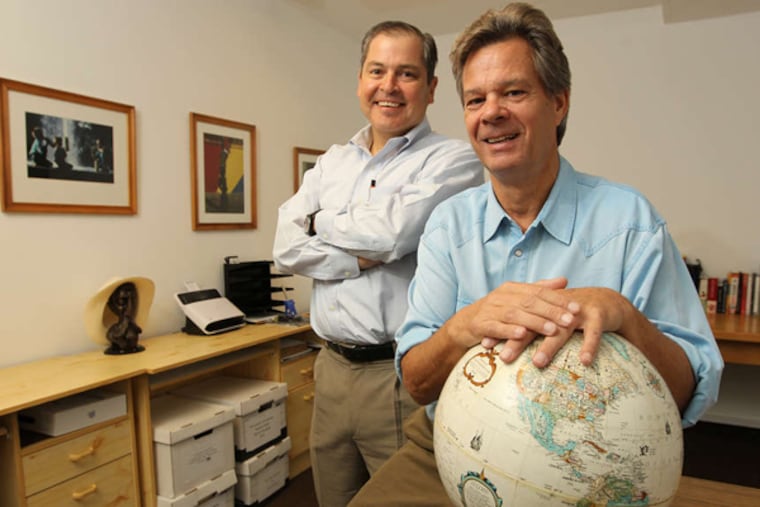Well Being: Eco-tourism? No - eco-immersion
When Crawford Hill was a biology teacher at Episcopal Academy, his core pedagogical principle was to "give pause" - to encourage students to stop, look, pay attention, "to see things through a new lens about themselves and the world around them."

When Crawford Hill was a biology teacher at Episcopal Academy, his core pedagogical principle was to "give pause" - to encourage students to stop, look, pay attention, "to see things through a new lens about themselves and the world around them."
In 1999, Hill led a dozen students on a two-week trip to Costa Rica. It was, he says, "a life-changing experience for them and for me." The Costa Rica trip became a yearly ritual for Hill and students.
In 2010, after 35 years, Hill, 62, retired from the classroom, though he is still very much a teacher. He does his educating now through an Ardmore-based business he founded, Chill Expeditions, which opens the minds of students and adults to natural wonders not only in Costa Rica but in Spain, Nicaragua, Ecuador, and the Galapagos Islands.
He describes his expeditions as "eco-immersion," as opposed to eco-tourism, which he dismisses as "a tour with a green veneer."
With eco-immersion, the idea is to go deeper, not just wider. This is achieved through experiences and service projects that encourage interaction with indigenous people, and with local guides who relay information through stories that resonate more than a shower of facts.
"It's like traveling with a favorite uncle who knows the place like the back of his hand and is eager to share his passion," Hill says. "He knows the biology, the geology, the culture, the history, the politics, and all the nuances. Most important, he knows fascinating people. We call such guides 'visionaries.' "
The goal, besides all you see and do, is to meet "three or four unbelievable people who may alter your vision, the way you view life."
Hill's expeditions are designed to stir physical adrenaline - rappelling down a waterfall, climbing 80-foot trees, whitewater rafting, doing yoga in the jungle themed to that day's activity (overcoming fear, exercising compassion, etc.), but they are also meant to trigger what Hill calls "intellectual adrenaline."
"It's hard to blow Costa Rica, with the wild monkeys, the volcanoes, the gorgeous weather," he says. "But there's much more than what you see on the surface. When you're exposed to the stories beneath the surface, the physical and emotional adrenaline combine to fire up the intellectual adrenaline and you're able to see beyond the immediate WOW!"
For example, damming Costa Rica's Pacuare River may seem like a reasonable way to make hydroelectric power, but raft down the river with local folks, spend time in their villages and homes, Hill says, and you'll soon realize that the matter is much more complicated.
Another of Hill's adages is that "the abnormal reveals the normal," the extraordinary illuminates the ordinary. In Central America, the extraordinary is common, and the terrain, the array of rare animals, the prelapsarian beauty all conspire to shock the senses into vivid awareness, a state that can be taken home, enabling one to regard afresh so much taken for granted.
"There's something about going to a place so extreme that makes students remember it," says biology teacher Natalie Mayer, cochair of the science department at Friends Select School. Last summer, she took her students on two Chill expeditions to Costa Rica.
One technique Hill uses to foster close observation, Mayer says, is assigning each student to make a list. "It may be a list of every kind of fruit you saw, or religion you encountered, or songs you heard, or drinks you tried, or food you ate," she says. "It's all about seeing and paying attention to details."
Hearing this, I thought about how people tend to be like either birds or trees. Birds see a lot, but often from on high and at cruising speed. Trees, by contrast, sink roots and know one spot well. Some people need the stimulation of the new; others can find an infinite cosmos in their backyards.
The recipe for well-being, I think, is to combine aspects of both, to live life both widely and deeply. It's a view Hill implicitly endorses in his trips.
You don't have to go to Costa Rica or the Galapagos Islands to grasp the rubies in the routine.
An idea Hill is pondering: eco-immersion expeditions here.
"Philadelphia is an unbelievable universe," Hill says. "Most of us have only tapped the surface of what's in front of us-the environment, the culture, the architecture, the neighborhoods. There's a lot of cool stuff, if you slow down and dare to engage."
It's a matter of giving pause.
For more, see www.chillexpeditions.com or call 1-800-551-7887. Student trips can range from $250 to $350 day, not including airfare.